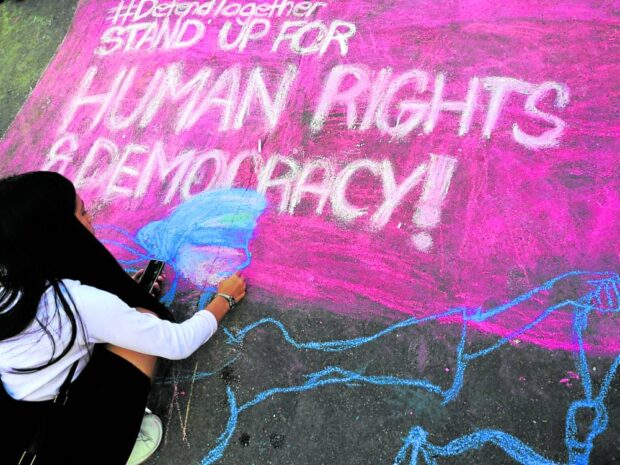
WRITING ON THE ROAD Session Road in Baguio City turns into a canvas for visual artists during Sundays when the street is closed to vehicles. In this photo taken on Aug. 12, 2019, the historic downtown road serves as venue for protest art as young artists create chalk messages to promote human rights alongside other murals. —EV ESPIRITU
BAGUIO CITY—Street performances, exhibitions and even street chalk art that are “subversive” in nature have been barred from downtown Session Road here whenever it is turned into a pedestrian mall on Sundays, according to new rules imposed by the city tourism office.
“Expression of political views and portrayals that negatively question or express opinions about social and political issues are not allowed,” stated one of the rules governing residents or tourists who would decide to draw on the pavement using colored chalk.
The set of rules, released last week, also said that “graphic or literal suggestions and expressions of subversive acts or movements will not be tolerated.”
“Depiction of overtly erotic, sexual and violent images or innuendos [is] not allowed,” the new rules also stressed.
It was not clear whether printing words like “karapatan (civic right)” or “Gabriela (referring to the party list group)” on Baguio pavements constitutes subversion under the new regulations.
Back in January, a group of women claimed they were harassed by a police officer for writing down a chalk message that he found politically offensive.
Aloysius Mapalo, Baguio tourism officer, said the new rules would make the Sunday experience apolitical.
“We simply wanted to promote more wholesome and safe creative expressions and entertainment on Sundays, all within socially and culturally accepted norms and veering away from offending messages and acts, or worse, those that may already be criminal in nature,” Mapalo told the Inquirer on Friday.
When Mayor Benjamin Magalong assumed office in 2019, he directed the closure of Session Road every Sunday to promote “walkability,” reduce air pollution and allow business start-ups a venue to promote their products.
Since 2008, the pedestrianization of Session Road has been the core subject of a movement led by retired city architect Joseph Alabanza who advocated “low-key” development for the overcrowded summer capital.
Residents reclaimed the busy street for nine hours in 2012 when Session Road was closed for the first time to vehicles as part of a traffic experiment, but it only drew complaints from Baguio motorists caught in gridlock surrounding the central business district.
Canvas
“Sunday Session” under Magalong’s term, soon became a tourist attraction after the local tourism office highlighted the road’s historic relevance. The road was the route taken by officials of the American colonial government to the Baden-Powell Hall, where they established the country’s bureaucracy in 1904 as members of the second Philippine Commission.
Since 2019, the historic street had also served as a canvas for protest art. Young artists drew chalk messages that promoted human rights alongside beautiful chalk murals and the rendering of anime characters.
The new regulations arose from a city government audit conducted last year, which revealed that buskers (street performers like musicians and costumed teens) have begun to crowd the area.
Some merchants who put up Sunday stalls in previous years “abused their privileges” and were selling items already available in shops and the city market, the audit also observed.
Beginning on May 7, buskers and chalk artists are all barred from expressing political issues as Sunday Session resumes after a three-week lull.
The new rules now require potential Sunday traders, musicians, dance performers, low-grade game providers like an archery station, and costumed performers to sign up at a central registry, so they could be provided with designated dates to use the downtown street.
Costumed children and teenagers who are younger than 18 years old are no longer allowed to stand at Session Road for photographs in exchange for tips and other gratuities.
Baguio arts and crafts booths would now be granted exclusive space at Calderon Street, which branches off from the middle of Session Road, to promote the city’s designation as the country’s first “Creative City.”